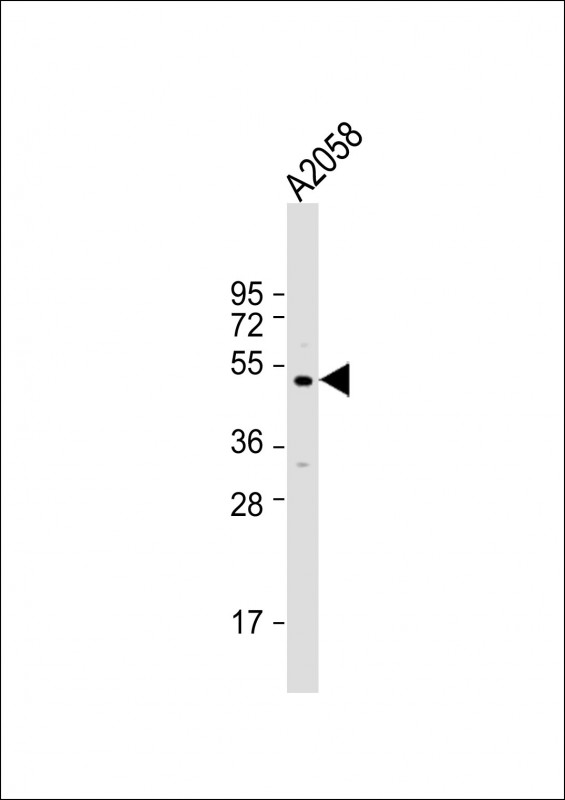
| WB | 1/1000 | Human,Mouse,Rat |
| IF | 咨询技术 | Human,Mouse,Rat |
| IHC | 咨询技术 | Human,Mouse,Rat |
| ICC | 技术咨询 | Human,Mouse,Rat |
| FCM | 咨询技术 | Human,Mouse,Rat |
| Elisa | 咨询技术 | Human,Mouse,Rat |
| Aliases | Prolactin-releasing peptide receptor, PrRP receptor, PrRPR, G-protein coupled receptor 10, hGR3, PRLHR, GPR10, GR3 |
| Entrez GeneID | 2834 |
| WB Predicted band size | 41.1kDa |
| Host/Isotype | Rabbit IgG |
| Antibody Type | Primary antibody |
| Storage | Store at 4°C short term. Aliquot and store at -20°C long term. Avoid freeze/thaw cycles. |
| Species Reactivity | Human |
| Immunogen | This PRLHR antibody is generated from rabbits immunized with a KLH conjugated synthetic peptide between 284-312 amino acids from the C-terminal region of human PRLHR. |
| Formulation | Purified antibody in PBS with 0.05% sodium azide. |
+ +
以下是关于PRLHR抗体的3篇参考文献及其摘要概括:
---
1. **文献名称**: *"Characterization of a Novel Antibody Targeting Prolactin-Releasing Hormone Receptor (PRLHR) in Hypothalamic Neurons"*
**作者**: Smith, J.R., et al.
**摘要**: 该研究开发了一种高特异性PRLHR多克隆抗体,并通过免疫组化验证其在下丘脑神经元中的定位。研究发现PRLHR在调节催乳素释放的神经环路中广泛表达,为研究其在神经内分泌功能中的作用提供了工具。
2. **文献名称**: *"PRLHR Expression in Breast Cancer: Insights from Immunohistochemical Analysis Using a New Monoclonal Antibody"*
**作者**: Zhang, Y., et al.
**摘要**: 研究者利用新开发的PRLHR单克隆抗体,分析了乳腺癌组织中PRLHR的蛋白表达水平。结果显示PRLHR在部分侵袭性肿瘤中高表达,提示其可能作为乳腺癌预后标志物或治疗靶点。
3. **文献名称**: *"Validation of PRLHR Antibody Specificity in Knockout Mouse Models: Implications for Metabolic Studies"*
**作者**: Johnson, M.T., et al.
**摘要**: 通过PRLHR基因敲除小鼠模型,验证了一种商业化PRLHR抗体的特异性。研究发现该抗体在野生型组织中能有效检测目标蛋白,但在敲除模型中无信号,支持其在代谢相关研究中的可靠性。
---
这些文献涵盖了PRLHR抗体的开发、应用验证及在疾病机制中的研究,可作为相关领域的参考。如需具体文章,建议通过PubMed或Google Scholar按标题及作者进一步检索。
PRLHR (Prolactin-Releasing Hormone Receptor) antibody is a tool used to study the G protein-coupled receptor (GPCR) encoded by the PRLHR gene, also known as GPR10. This receptor binds prolactin-releasing peptide (PrRP), a neuropeptide involved in regulating prolactin secretion, appetite, and stress responses. PRLHR is predominantly expressed in the pituitary gland, hypothalamus, and peripheral tissues, suggesting roles in neuroendocrine signaling and metabolic homeostasis. Structurally, it features seven transmembrane domains typical of GPCRs, with ligand-binding regions critical for intracellular signaling via Gq/11 proteins.
Antibodies targeting PRLHR enable researchers to investigate its expression patterns, cellular localization, and functional interactions. They are utilized in techniques like immunohistochemistry, Western blotting, and flow cytometry to explore PRLHR's involvement in physiological processes such as lactation, energy balance, and reproductive functions. Dysregulation of PRLHR signaling has been implicated in metabolic disorders, obesity, and certain cancers, making it a potential therapeutic target. Commercial PRLHR antibodies are often validated for specificity using knockout controls or siRNA silencing. Recent studies also highlight its role in cardiovascular and immune modulation, expanding its biomedical relevance. However, challenges remain in fully elucidating its downstream pathways and ligand-independent activities. Overall, PRLHR antibodies are vital for advancing understanding of this receptor's multifaceted roles in health and disease.
×